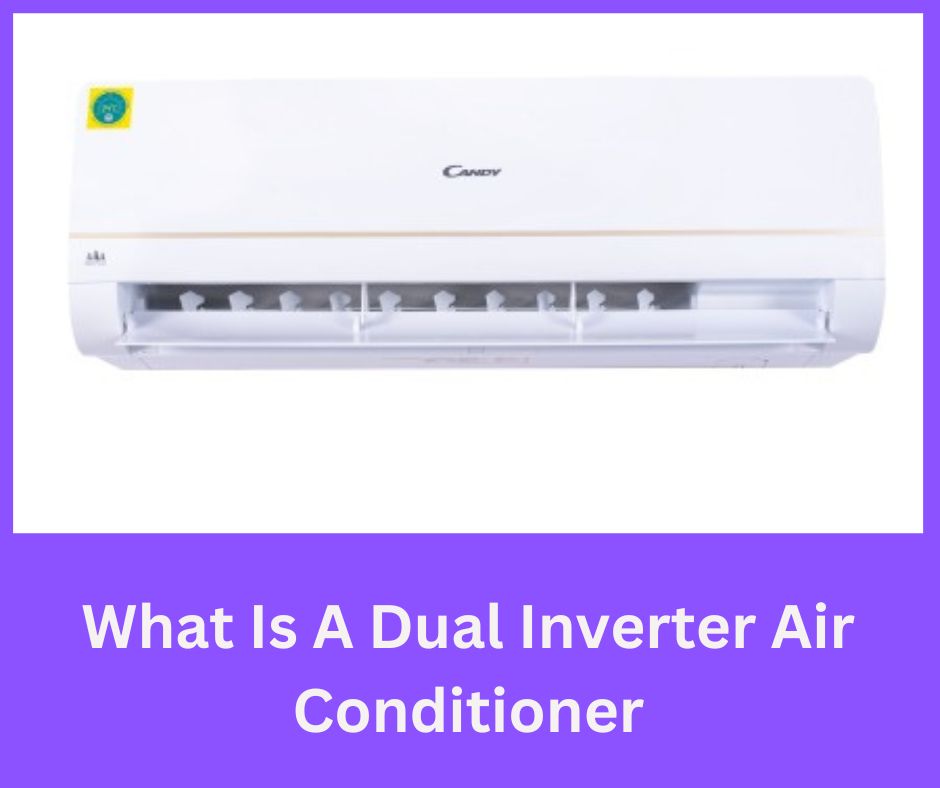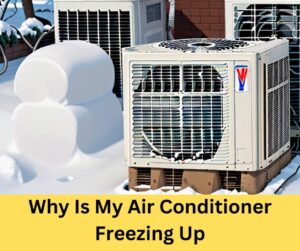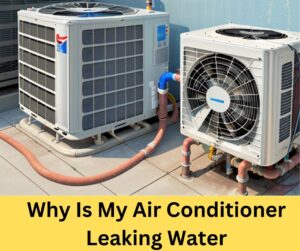A dual inverter air conditioner is a type of air conditioner that employs inverter technology to control the speed of the compressor motor, allowing it to maintain the target temperature in a room or space more effectively.
What Is A Dual Inverter Air Conditioner
Because they do not have to switch on and off repeatedly to maintain the appropriate temperature, inverter air conditioners can conserve energy and lower running expenses as compared to traditional air conditioners. Instead, inverter technology enables the compressor to alter its speed and power consumption as needed to maintain a constant temperature. Dual inverter air conditioners often contain two inverters, one for the interior unit and one for the outdoor unit, which can increase the energy efficiency and performance of the system.
What Is A Dual Inverter Air Conditioner

Why do we buy a dual inverter air conditioner
Energy efficiency and performance:
- One of the primary benefits of twin inverter air conditioners is their high energy efficiency and performance. A dual inverter air conditioner can keep a steady temperature while consuming less energy than typical air conditioners because it uses inverter technology to continually change the speed and power use of the compressor. This can lead to decreased operational costs and energy usage.
Consistent temperature:
- In addition, dual inverter air conditioners can give more constant temperature management than typical air conditioners. The temperature in the room or area is less likely to vary since inverter technology allows the compressor to continually alter its speed and power use as needed. This might make the interior climate more comfortable and constant.
Improved air quality:
- Some dual inverter air conditioners have innovative air filtering technologies that can assist to enhance the air quality in a room or space. This is especially good for persons who suffer from allergies or respiratory problems since it helps to eliminate allergens and pollutants from the air.
Quieter operation:
- Another advantage of dual inverter air conditioners is that they may operate more quietly than standard air conditioners. This is especially useful in homes or businesses where noise levels must be kept low.
Longer lifespan:
- Dual inverter air conditioners may have a longer lifespan than typical air conditioners due to their energy-efficient design and innovative technology. This can lead to long-term cost savings as well as decreased maintenance and replacement requirements.
Are there any disadvantages of dual inverter ac
Although dual inverter ACs have many benefits, there are also some potential disadvantages to consider:
- Higher initial cost: Dual inverter air conditioners may be more expensive than traditional air conditioners or inverter air conditioners with only one inverter.
- Due to the multiple inverters and advanced technology, dual inverter air conditioners may necessitate more difficult installation and maintenance. When compared to standard air conditioners, this may raise the cost of installation and maintenance.
- Dual inverter air conditioners may not be suited for all types of buildings or climates. They may not be suited for buildings with insufficient power supply or for places with high-temperature swings, for example.
- Possible reliability difficulties: Dual inverter ACs, like any sophisticated system, are susceptible to dependability issues. This might lead to expensive repairs or replacements if the system experiences problems.
Before making a purchase choice, it is essential to carefully analyze the possible drawbacks of a dual inverter AC and to select a reputable and trusted brand to reduce the risk of dependability difficulties.
What is the difference between dual inverter ac VS inverter AC?
A dual inverter air conditioner and an inverter air conditioner differ primarily in terms of how many inverters they have when it comes to air conditioning systems. There is just one inverter in an inverter air conditioner, and it controls the compressor motor’s speed to effectively maintain the target temperature. On the other hand, a dual inverter air conditioner contains two inverters—one for the inside unit and one for the outside unit.
Because each inverter may independently change the speed and power use of the associated unit as needed to maintain a constant temperature, having two inverters can boost the system’s energy efficiency and performance.
Additionally, a dual inverter AC could cost more upfront than an inverter AC, but because of its improved energy efficiency, it might also cost less to operate.
A Comparison Table Of Dual Inverter Ac Vs Inverter Ac
Here is a comparison table of dual inverter AC vs inverter AC:
| Dual Inverter | Inverter |
|---|---|
| Has two inverters | Has one inverter |
| One inverter for indoor unit, one for outdoor unit | Inverter regulates speed of compressor motor |
| May be more energy efficient and have better performance | May be less energy efficient |
| May have higher upfront cost | May have lower upfront cost |
| May have lower operating costs | May have higher operating costs |
It’s important to remember that the actual performance and price differences between a dual inverter AC and an inverter AC can change depending on a number of variables, including the unit’s size and type, the climate and temperature of the location it is being used in, and the unit’s specific features and capabilities.
Dual Inverter Vs Triple Inverter Ac Difference
The number of inverters utilized in the air conditioning system is the primary distinction between a dual inverter AC and a triple inverter AC. A triple inverter AC has three inverters: one for the compressor, one for the indoor unit, and one for the outdoor unit. A dual inverter AC has two inverters, one for the indoor unit and one for the outside unit.
To effectively maintain the required temperature in a room or space, inverters are used to control the speed of the compressor motor. A triple inverter AC, as opposed to a twin inverter AC, could be able to further increase the system’s energy efficiency and performance by adding more inverters. However, a triple inverter air conditioner could also cost more upfront than a dual inverter air conditioner.
It’s critical to remember that the actual performance and cost differences between a dual inverter AC and a triple inverter AC may differ depending on a number of variables, including the unit’s size and type, the climate and temperature of the location it is being used in, and the unit’s specific features and capabilities.
How Dual Inverters Reduce Electricity Bills
By effectively controlling the speed of the compressor motor with inverter technology, dual inverter air conditioners may assist save energy costs while maintaining the ideal temperature in a room or space. In order to maintain the required temperature, traditional air conditioners often employ a fixed-speed compressor that cycles on and off. This can be less energy efficient and raise power costs.
As a consequence, an inverter AC may use less energy and have lower running expenses since it can continually modify the compressor’s speed and power use based on the room’s demands for temperature. A dual inverter AC can increase the system’s energy efficiency and performance by having two inverters, one for the interior unit and one for the outside unit.
It’s crucial to remember that real energy savings and power bill reductions rely on a number of variables, including the unit’s size and kind, the environment and temperature where it’s being used, and its particular features and capabilities.
Pros And Cons Of Dual Inverter Ac
Here are some pros and cons of dual inverter AC:
Pros:
- Can be more energy efficient and have better performance compared to traditional air conditioners
- Can save on operating costs due to lower energy consumption
- Can provide consistent temperature and better air quality
- May have quieter operation
Cons:
- May be more expensive upfront compared to traditional air conditioners
- May require more complex installation and maintenance
- May not be suitable for all types of buildings or climates
Do We Need Voltage Stabilizer For Dual Inverter AC?
An inverter air conditioner, especially a twin inverter AC, is often advised to utilize a voltage stabilizer in order to protect the device from voltage fluctuations and maintain optimal operation. Voltage fluctuations outside of the inverter AC’s intended operating range can harm the device or lower its performance and efficiency. Inverter ACs are designed to function within a certain voltage range.
An electrical device called a voltage stabilizer also referred to as a voltage regulator, aids in maintaining a constant voltage supply to the AC unit. The input voltage is continually monitored and adjusted as necessary to maintain the desired range.
It’s crucial to remember that voltage stabilizers might not always be required. A voltage stabilizer may not be required, for instance, if the power supply in your region is typically steady and constant and there are no significant voltage changes. Using a voltage stabilizer in conjunction with your twin inverter AC is optional in this situation.
conclusion
In conclusion, dual inverter air conditioners are a type of air conditioning system that effectively maintains the ideal temperature in a room or space by controlling the speed of the compressor motor using inverter technology. Compared to conventional air conditioners, they can provide a number of benefits, including increased energy efficiency, reliable temperature control, better air quality, quieter operation, and a longer lifespan. In contrast to conventional air conditioners, twin inverter air conditioners may also cost more upfront and need more difficult installation and maintenance. Before making a purchase choice, it’s critical to thoroughly weigh the benefits and drawbacks of a dual inverter air conditioner. To reduce the likelihood of dependability problems, pick a recognized and dependable brand.



